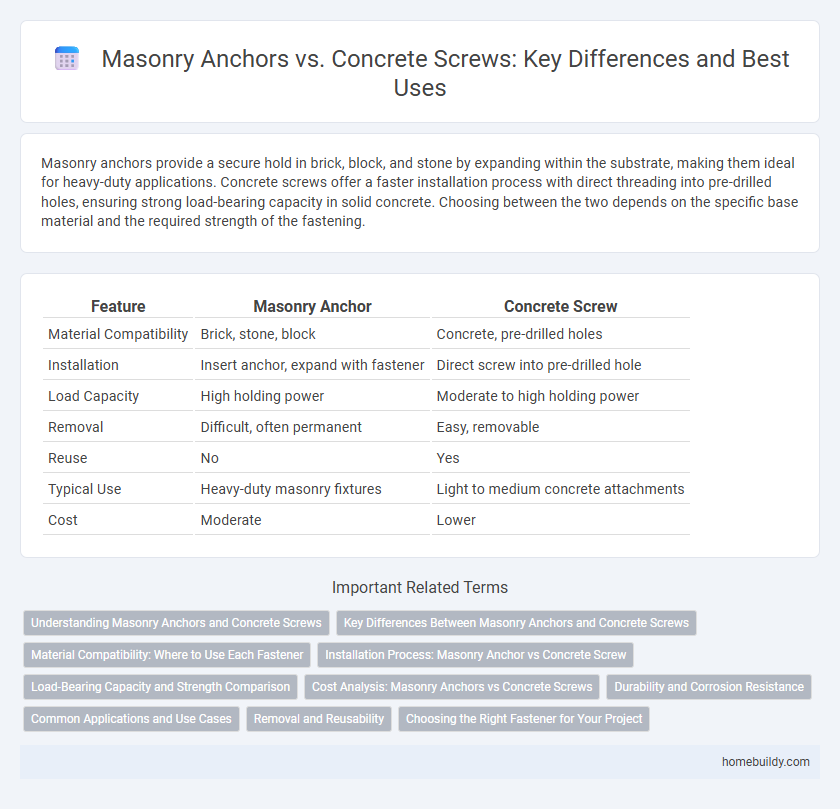Masonry anchors provide a secure hold in brick, block, and stone by expanding within the substrate, making them ideal for heavy-duty applications. Concrete screws offer a faster installation process with direct threading into pre-drilled holes, ensuring strong load-bearing capacity in solid concrete. Choosing between the two depends on the specific base material and the required strength of the fastening.
Table of Comparison
| Feature | Masonry Anchor | Concrete Screw |
|---|---|---|
| Material Compatibility | Brick, stone, block | Concrete, pre-drilled holes |
| Installation | Insert anchor, expand with fastener | Direct screw into pre-drilled hole |
| Load Capacity | High holding power | Moderate to high holding power |
| Removal | Difficult, often permanent | Easy, removable |
| Reuse | No | Yes |
| Typical Use | Heavy-duty masonry fixtures | Light to medium concrete attachments |
| Cost | Moderate | Lower |
Understanding Masonry Anchors and Concrete Screws
Masonry anchors provide secure fastening by expanding within drilled holes in brick, block, or stone, ensuring reliable load-bearing capacity for structural and non-structural applications. Concrete screws feature hardened steel threads designed to cut into pre-drilled concrete, delivering quick installation and strong holding power without the need for anchor sleeves. Both fasteners are essential for heavy-duty attachment in masonry environments, with selection depending on material type, load requirements, and installation method.
Key Differences Between Masonry Anchors and Concrete Screws
Masonry anchors use expansion or chemical adhesion to secure fasteners into brick, block, or stone, providing strong resistance in brittle materials. Concrete screws tap threads directly into pre-drilled holes, allowing for easy installation and removal in solid concrete. Key differences include installation method, holding strength, and suitability for different substrates, with masonry anchors offering higher load capacities in hollow materials while concrete screws excel in solid concrete applications.
Material Compatibility: Where to Use Each Fastener
Masonry anchors are ideal for use with brick, block, and stone due to their expansion mechanism that grips porous materials securely. Concrete screws are specifically designed for solid concrete, providing a strong, direct hold with threads that cut into the dense substrate. Choosing the right fastener depends on substrate hardness and porosity, ensuring optimal load-bearing performance and durability.
Installation Process: Masonry Anchor vs Concrete Screw
The installation process for masonry anchors requires drilling a hole into the masonry surface, cleaning the hole to remove dust, then inserting the anchor before tightening a bolt or screw to secure the fixture. Concrete screws demand pre-drilling a precisely sized pilot hole directly into the concrete, followed by driving the screw using a high-torque drill without the need for additional inserts. Both methods require proper hole depth and diameter, but concrete screws typically allow faster installation by eliminating the need for anchor setting.
Load-Bearing Capacity and Strength Comparison
Masonry anchors typically provide higher load-bearing capacity due to their expansion mechanisms that distribute force within the substrate more effectively than concrete screws. Concrete screws offer reliable strength for lighter to moderate loads and are favored for ease of installation and removal but may not perform as well under heavy shear or tensile stresses. Selecting between the two depends on the specific load requirements and the type of masonry or concrete material involved.
Cost Analysis: Masonry Anchors vs Concrete Screws
Masonry anchors typically cost less per unit than concrete screws, offering a budget-friendly option for heavy-duty fastening in masonry materials. Concrete screws, while slightly more expensive, reduce labor costs due to faster installation and eliminate the need for pre-drilling in some applications. Evaluating total project expenses requires balancing material costs with time savings and long-term performance in specific fastening environments.
Durability and Corrosion Resistance
Masonry anchors offer superior durability in heavy-duty applications by embedding deep into concrete or brick, providing stable and long-lasting support under high stress. Concrete screws, often made from hardened steel with corrosion-resistant coatings like zinc or stainless steel, deliver excellent corrosion resistance, especially in moist or outdoor environments. When selecting between the two, masonry anchors excel in structural strength and weight-bearing capacity, while concrete screws provide easier installation with enhanced resistance to rust and environmental degradation.
Common Applications and Use Cases
Masonry anchors are frequently used in applications requiring strong, permanent attachments to brick, stone, or block walls, such as mounting heavy fixtures, securing railings, or installing outdoor signage. Concrete screws offer efficient fastening solutions for lighter loads and temporary installations like electrical boxes, shelving, or lightweight framing directly into concrete surfaces. Both fasteners provide reliable holding power but differ in installation techniques and suitability based on substrate type and load requirements.
Removal and Reusability
Masonry anchors are designed for permanent installation, making removal difficult and often compromising their holding strength, thus limiting reusability. Concrete screws can be removed and reinstalled with minimal loss of performance, offering a practical solution for temporary or adjustable fastening needs. Choosing concrete screws enhances flexibility in projects requiring frequent disassembly or repositioning.
Choosing the Right Fastener for Your Project
Masonry anchors provide superior holding power in hollow or brittle materials like brick or block, while concrete screws are ideal for solid concrete due to their high tensile strength and ease of installation. Selecting the right fastener depends on substrate type, load requirements, and installation conditions, with masonry anchors offering enhanced vibration resistance and concrete screws providing quick removability. For optimal performance, evaluate project specifics such as material density, environmental exposure, and fastening depth before deciding between these specialized fasteners.
Masonry Anchor vs Concrete Screw Infographic

 homebuildy.com
homebuildy.com